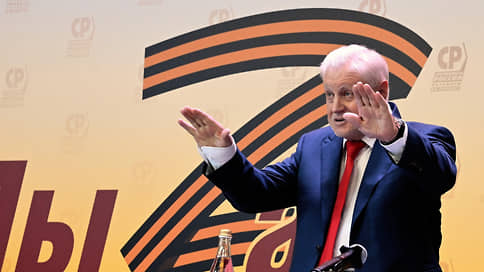Sergei Mironov summed up the results of the essay contest “Why does the West need a war with Russia?”
[ad_1]

Sergei Mironov, chairman of Just Russia – For Truth (SRZP), summed up the results of the party essay contest “Why does the West need a war with Russia?”, timed to coincide with the anniversary of the start of the military operation in Ukraine. Out of more than seventy works, Mr. Mironov personally selected 26 – excerpts from them the politician promised to use in the development of policy statements. The best authors, the vast majority of whom turned out to be senior students, were encouraged to take a tour of the State Duma.
One of the four winners, international student Gleb Vlasov from Tyumen, assured the Kommersant correspondent that he had nothing to do with SRHR, and sent the essay simply because he was interested in the topic: “Well, the party and the party. Their views don’t matter here. I’m generally a centrist. But yes, these guys (from the youth cells of the SRZP.— “b”) there are many. According to the latter, participation in the competition is a good way to show oneself to both local and metropolitan authorities. Among the laureates were representatives of the “youth” SRZP from new Russian regions. “The party works great with the youth, the mentoring system is well developed,” Anastasia Zhigulina from Donetsk described the benefits of SRHR. “The main thing is that here all your questions and suggestions are listened to and heard.” Anastasia Zhigulina and her colleague from Lugansk, Kirill Demidenko, promised a Kommersant correspondent that Russians would put skeptics to shame in elections in new regions.
Sergei Mironov was also optimistic. The politician received twenty visibly embarrassed laureates in the party wing of the State Duma building on Okhotny Ryad in an official setting. “Looking at your faces… somehow I felt calm about the future of Russia,” the chairman of the SRZP told the assembled essayists. “I have no doubt that our future will be positive.” Further, Mr. Mironov admitted that he often draws inspiration and ideas for bills directly “from the people”, and told the young guests that he intended to “take into service” quotes from their works. More than the rest, the leader of the SRZP was pleased with the turn of the same Anastasia Zhigulina: “Russia will also survive because God has plans for it.”
Excerpts from the works underlined by Mr. Mironov were shown on the big screen. No one doubted the coming victory of Russia. About how this victory will look like, the authors argued in absentia. Thus, Kirill Demidenko, a resident of Lugansk, suggested that Russia would go from import substitution “to mass exports” and Russian cars “would fill the roads of America and Europe.” Gleb Vlasov from Tyumen advised to stay away from such roads: “There are insoluble contradictions between us and them.” The latter was echoed by numerous authors categorically and belligerently: “With the end of the NWO, the conflict will not end, since the West’s campaign to eliminate Russia is eternal”, “The West brings war, thousands of ragged lives, scorched earth and degeneration”, “The conflict between Russia and of the West is a continuous process, it will never be completely exhausted”, “Russia is not a colony of the Anglo-Saxons or Europeans, as they tried to present it in the 90s”… Only the Sverdlovsk lawyer Konstantin Bulavitsky, who attacked the internal opponent instead of external, though not without a hint of the latter: “Russia needs significant changes, primarily in terms of its political elite; the desire of the highest echelons of power to follow the liberal concepts of political, social and economic development does not have the best effect on our country.”
“When I read the essay, I felt a sense of pride for you, youth, because I read the thoughts of people who think, empathize, who can express their thoughts and views,” Sergei Mironov commented on the content. “To put it mildly, not all of your peers can do this.” Prize-winners and laureates of the party competition from Mr. Mironov got the autographed books of the politician. Referring to the first education of a geologist, the chairman of the SRZP handed over to the winners a bag with polished carnelian – for good luck – and even hinted at what luck could be directly expressed: “You were given a tour of the State Duma. Well, how do you like the corridors of power? Did you like it? Didn’t you try yourself in them? I had to try on! You have to dream.” It turned out that German Stepanchikov, a schoolboy from Primorye, just fulfilled what he had been dreaming about for a long time – he walked along the corridors of “not the government, not the Federation Council, but the State Duma.” The chairman of the SRZP was clearly moved, but with other guests he answered confidently – for example, to the question about the timing of the completion of the special operation: “I think no one knows the answer, including the supreme commander. Because we take care of our children.” However, a certain high-ranking military man told him that the one who now decides to attack first will lose, the chairman added. To other questions, Mr. Mironov answered with long-honed theses: “It is pointless to resist progress, but where is control?”, “The primacy of liberal ideas and liberal ideology is present, very serious work is needed here,” etc. In parting, Mr. Mironov promised to continue answering questions questions sent through a special form on the party’s website: “Indicate that we met on June 8, and I will definitely remember you.”
[ad_2]
Source link








